Treating Older People With Intellectual Disabilities | Doc
VerifiedAdded on 2022/08/13
|10
|2870
|18
AI Summary
Contribute Materials
Your contribution can guide someone’s learning journey. Share your
documents today.
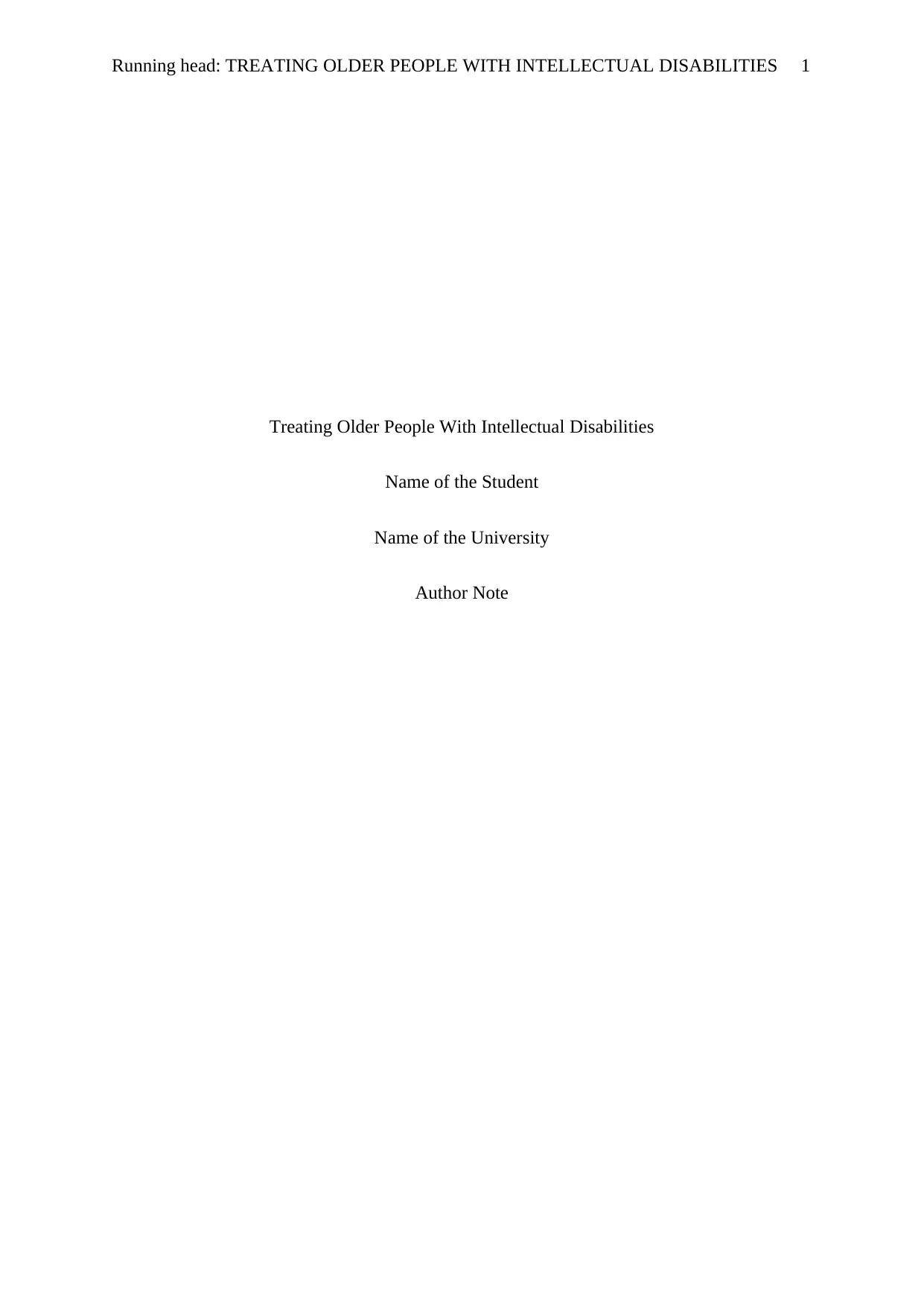
Running head: TREATING OLDER PEOPLE WITH INTELLECTUAL DISABILITIES 1
Treating Older People With Intellectual Disabilities
Name of the Student
Name of the University
Author Note
Treating Older People With Intellectual Disabilities
Name of the Student
Name of the University
Author Note
Secure Best Marks with AI Grader
Need help grading? Try our AI Grader for instant feedback on your assignments.
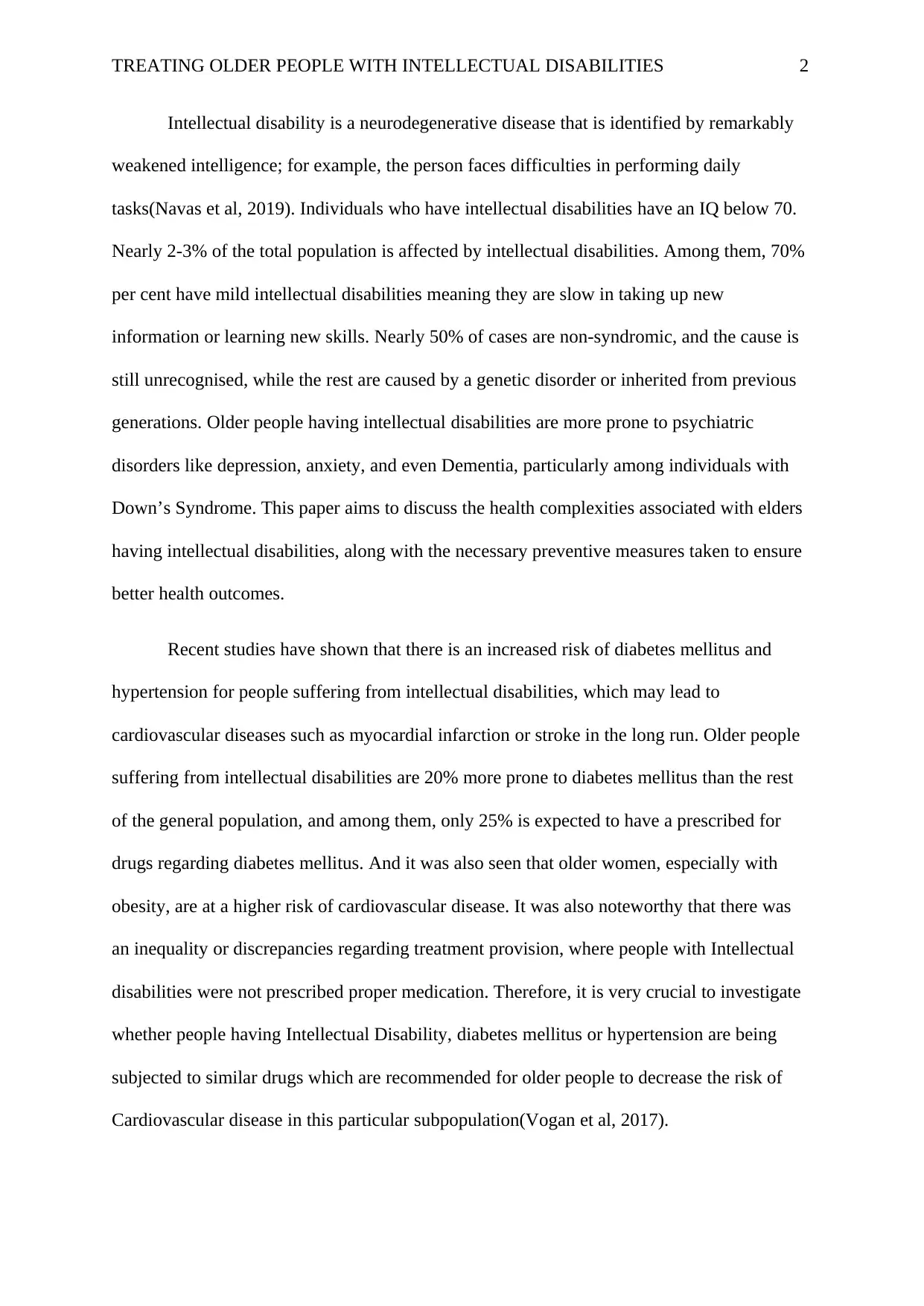
TREATING OLDER PEOPLE WITH INTELLECTUAL DISABILITIES 2
Intellectual disability is a neurodegenerative disease that is identified by remarkably
weakened intelligence; for example, the person faces difficulties in performing daily
tasks(Navas et al, 2019). Individuals who have intellectual disabilities have an IQ below 70.
Nearly 2-3% of the total population is affected by intellectual disabilities. Among them, 70%
per cent have mild intellectual disabilities meaning they are slow in taking up new
information or learning new skills. Nearly 50% of cases are non-syndromic, and the cause is
still unrecognised, while the rest are caused by a genetic disorder or inherited from previous
generations. Older people having intellectual disabilities are more prone to psychiatric
disorders like depression, anxiety, and even Dementia, particularly among individuals with
Down’s Syndrome. This paper aims to discuss the health complexities associated with elders
having intellectual disabilities, along with the necessary preventive measures taken to ensure
better health outcomes.
Recent studies have shown that there is an increased risk of diabetes mellitus and
hypertension for people suffering from intellectual disabilities, which may lead to
cardiovascular diseases such as myocardial infarction or stroke in the long run. Older people
suffering from intellectual disabilities are 20% more prone to diabetes mellitus than the rest
of the general population, and among them, only 25% is expected to have a prescribed for
drugs regarding diabetes mellitus. And it was also seen that older women, especially with
obesity, are at a higher risk of cardiovascular disease. It was also noteworthy that there was
an inequality or discrepancies regarding treatment provision, where people with Intellectual
disabilities were not prescribed proper medication. Therefore, it is very crucial to investigate
whether people having Intellectual Disability, diabetes mellitus or hypertension are being
subjected to similar drugs which are recommended for older people to decrease the risk of
Cardiovascular disease in this particular subpopulation(Vogan et al, 2017).
Intellectual disability is a neurodegenerative disease that is identified by remarkably
weakened intelligence; for example, the person faces difficulties in performing daily
tasks(Navas et al, 2019). Individuals who have intellectual disabilities have an IQ below 70.
Nearly 2-3% of the total population is affected by intellectual disabilities. Among them, 70%
per cent have mild intellectual disabilities meaning they are slow in taking up new
information or learning new skills. Nearly 50% of cases are non-syndromic, and the cause is
still unrecognised, while the rest are caused by a genetic disorder or inherited from previous
generations. Older people having intellectual disabilities are more prone to psychiatric
disorders like depression, anxiety, and even Dementia, particularly among individuals with
Down’s Syndrome. This paper aims to discuss the health complexities associated with elders
having intellectual disabilities, along with the necessary preventive measures taken to ensure
better health outcomes.
Recent studies have shown that there is an increased risk of diabetes mellitus and
hypertension for people suffering from intellectual disabilities, which may lead to
cardiovascular diseases such as myocardial infarction or stroke in the long run. Older people
suffering from intellectual disabilities are 20% more prone to diabetes mellitus than the rest
of the general population, and among them, only 25% is expected to have a prescribed for
drugs regarding diabetes mellitus. And it was also seen that older women, especially with
obesity, are at a higher risk of cardiovascular disease. It was also noteworthy that there was
an inequality or discrepancies regarding treatment provision, where people with Intellectual
disabilities were not prescribed proper medication. Therefore, it is very crucial to investigate
whether people having Intellectual Disability, diabetes mellitus or hypertension are being
subjected to similar drugs which are recommended for older people to decrease the risk of
Cardiovascular disease in this particular subpopulation(Vogan et al, 2017).
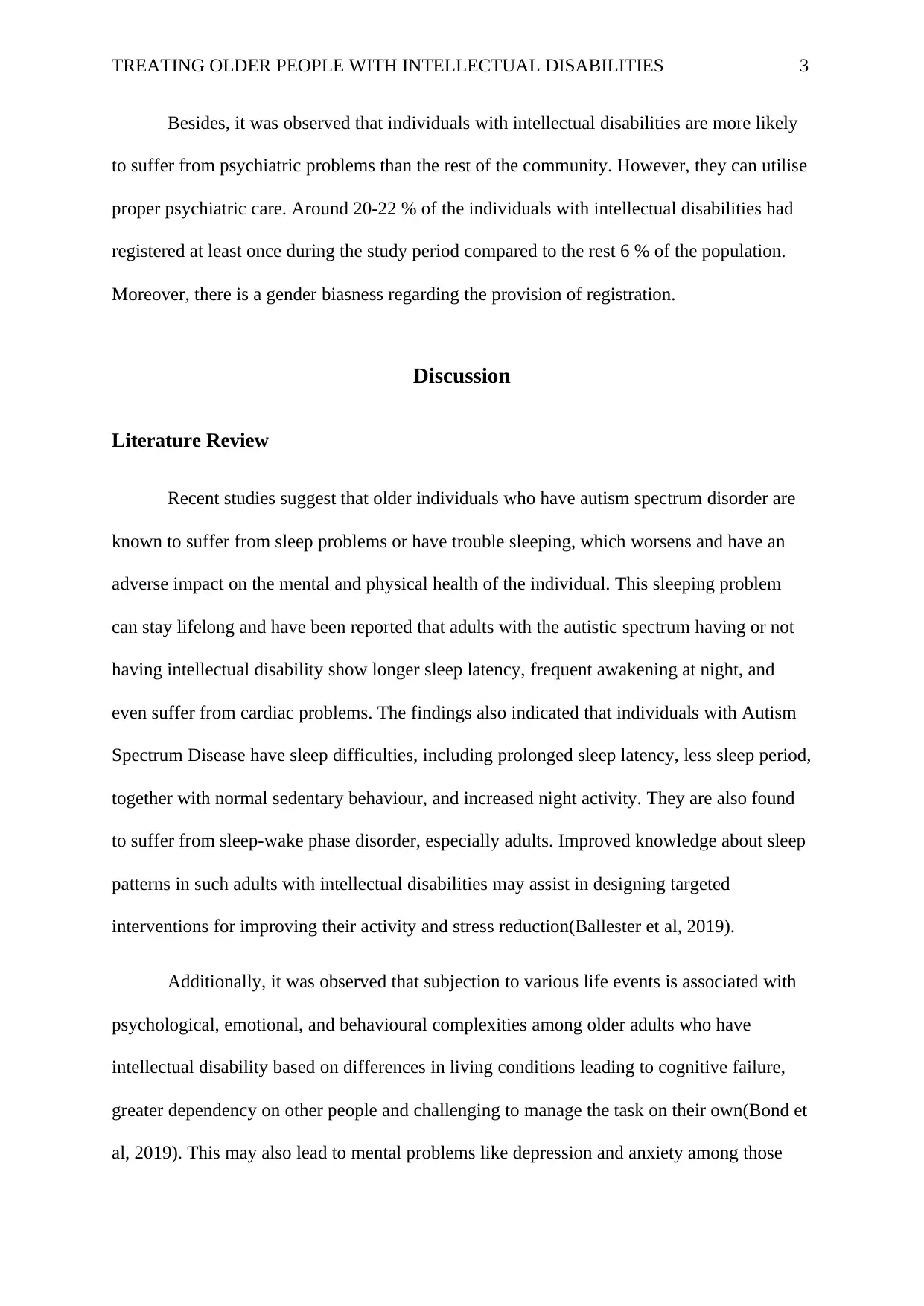
TREATING OLDER PEOPLE WITH INTELLECTUAL DISABILITIES 3
Besides, it was observed that individuals with intellectual disabilities are more likely
to suffer from psychiatric problems than the rest of the community. However, they can utilise
proper psychiatric care. Around 20-22 % of the individuals with intellectual disabilities had
registered at least once during the study period compared to the rest 6 % of the population.
Moreover, there is a gender biasness regarding the provision of registration.
Discussion
Literature Review
Recent studies suggest that older individuals who have autism spectrum disorder are
known to suffer from sleep problems or have trouble sleeping, which worsens and have an
adverse impact on the mental and physical health of the individual. This sleeping problem
can stay lifelong and have been reported that adults with the autistic spectrum having or not
having intellectual disability show longer sleep latency, frequent awakening at night, and
even suffer from cardiac problems. The findings also indicated that individuals with Autism
Spectrum Disease have sleep difficulties, including prolonged sleep latency, less sleep period,
together with normal sedentary behaviour, and increased night activity. They are also found
to suffer from sleep-wake phase disorder, especially adults. Improved knowledge about sleep
patterns in such adults with intellectual disabilities may assist in designing targeted
interventions for improving their activity and stress reduction(Ballester et al, 2019).
Additionally, it was observed that subjection to various life events is associated with
psychological, emotional, and behavioural complexities among older adults who have
intellectual disability based on differences in living conditions leading to cognitive failure,
greater dependency on other people and challenging to manage the task on their own(Bond et
al, 2019). This may also lead to mental problems like depression and anxiety among those
Besides, it was observed that individuals with intellectual disabilities are more likely
to suffer from psychiatric problems than the rest of the community. However, they can utilise
proper psychiatric care. Around 20-22 % of the individuals with intellectual disabilities had
registered at least once during the study period compared to the rest 6 % of the population.
Moreover, there is a gender biasness regarding the provision of registration.
Discussion
Literature Review
Recent studies suggest that older individuals who have autism spectrum disorder are
known to suffer from sleep problems or have trouble sleeping, which worsens and have an
adverse impact on the mental and physical health of the individual. This sleeping problem
can stay lifelong and have been reported that adults with the autistic spectrum having or not
having intellectual disability show longer sleep latency, frequent awakening at night, and
even suffer from cardiac problems. The findings also indicated that individuals with Autism
Spectrum Disease have sleep difficulties, including prolonged sleep latency, less sleep period,
together with normal sedentary behaviour, and increased night activity. They are also found
to suffer from sleep-wake phase disorder, especially adults. Improved knowledge about sleep
patterns in such adults with intellectual disabilities may assist in designing targeted
interventions for improving their activity and stress reduction(Ballester et al, 2019).
Additionally, it was observed that subjection to various life events is associated with
psychological, emotional, and behavioural complexities among older adults who have
intellectual disability based on differences in living conditions leading to cognitive failure,
greater dependency on other people and challenging to manage the task on their own(Bond et
al, 2019). This may also lead to mental problems like depression and anxiety among those
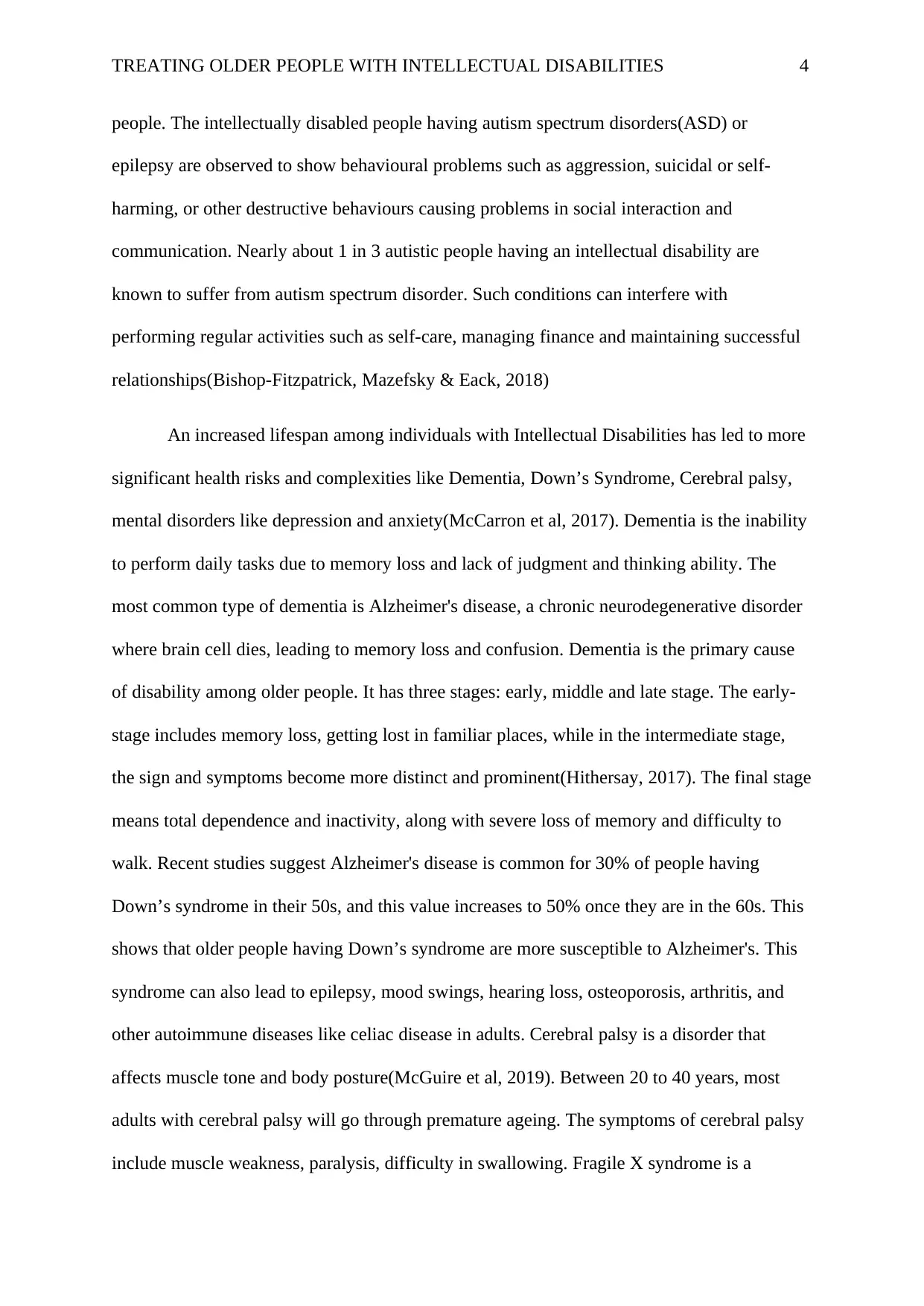
TREATING OLDER PEOPLE WITH INTELLECTUAL DISABILITIES 4
people. The intellectually disabled people having autism spectrum disorders(ASD) or
epilepsy are observed to show behavioural problems such as aggression, suicidal or self-
harming, or other destructive behaviours causing problems in social interaction and
communication. Nearly about 1 in 3 autistic people having an intellectual disability are
known to suffer from autism spectrum disorder. Such conditions can interfere with
performing regular activities such as self-care, managing finance and maintaining successful
relationships(Bishop-Fitzpatrick, Mazefsky & Eack, 2018)
An increased lifespan among individuals with Intellectual Disabilities has led to more
significant health risks and complexities like Dementia, Down’s Syndrome, Cerebral palsy,
mental disorders like depression and anxiety(McCarron et al, 2017). Dementia is the inability
to perform daily tasks due to memory loss and lack of judgment and thinking ability. The
most common type of dementia is Alzheimer's disease, a chronic neurodegenerative disorder
where brain cell dies, leading to memory loss and confusion. Dementia is the primary cause
of disability among older people. It has three stages: early, middle and late stage. The early-
stage includes memory loss, getting lost in familiar places, while in the intermediate stage,
the sign and symptoms become more distinct and prominent(Hithersay, 2017). The final stage
means total dependence and inactivity, along with severe loss of memory and difficulty to
walk. Recent studies suggest Alzheimer's disease is common for 30% of people having
Down’s syndrome in their 50s, and this value increases to 50% once they are in the 60s. This
shows that older people having Down’s syndrome are more susceptible to Alzheimer's. This
syndrome can also lead to epilepsy, mood swings, hearing loss, osteoporosis, arthritis, and
other autoimmune diseases like celiac disease in adults. Cerebral palsy is a disorder that
affects muscle tone and body posture(McGuire et al, 2019). Between 20 to 40 years, most
adults with cerebral palsy will go through premature ageing. The symptoms of cerebral palsy
include muscle weakness, paralysis, difficulty in swallowing. Fragile X syndrome is a
people. The intellectually disabled people having autism spectrum disorders(ASD) or
epilepsy are observed to show behavioural problems such as aggression, suicidal or self-
harming, or other destructive behaviours causing problems in social interaction and
communication. Nearly about 1 in 3 autistic people having an intellectual disability are
known to suffer from autism spectrum disorder. Such conditions can interfere with
performing regular activities such as self-care, managing finance and maintaining successful
relationships(Bishop-Fitzpatrick, Mazefsky & Eack, 2018)
An increased lifespan among individuals with Intellectual Disabilities has led to more
significant health risks and complexities like Dementia, Down’s Syndrome, Cerebral palsy,
mental disorders like depression and anxiety(McCarron et al, 2017). Dementia is the inability
to perform daily tasks due to memory loss and lack of judgment and thinking ability. The
most common type of dementia is Alzheimer's disease, a chronic neurodegenerative disorder
where brain cell dies, leading to memory loss and confusion. Dementia is the primary cause
of disability among older people. It has three stages: early, middle and late stage. The early-
stage includes memory loss, getting lost in familiar places, while in the intermediate stage,
the sign and symptoms become more distinct and prominent(Hithersay, 2017). The final stage
means total dependence and inactivity, along with severe loss of memory and difficulty to
walk. Recent studies suggest Alzheimer's disease is common for 30% of people having
Down’s syndrome in their 50s, and this value increases to 50% once they are in the 60s. This
shows that older people having Down’s syndrome are more susceptible to Alzheimer's. This
syndrome can also lead to epilepsy, mood swings, hearing loss, osteoporosis, arthritis, and
other autoimmune diseases like celiac disease in adults. Cerebral palsy is a disorder that
affects muscle tone and body posture(McGuire et al, 2019). Between 20 to 40 years, most
adults with cerebral palsy will go through premature ageing. The symptoms of cerebral palsy
include muscle weakness, paralysis, difficulty in swallowing. Fragile X syndrome is a
Secure Best Marks with AI Grader
Need help grading? Try our AI Grader for instant feedback on your assignments.
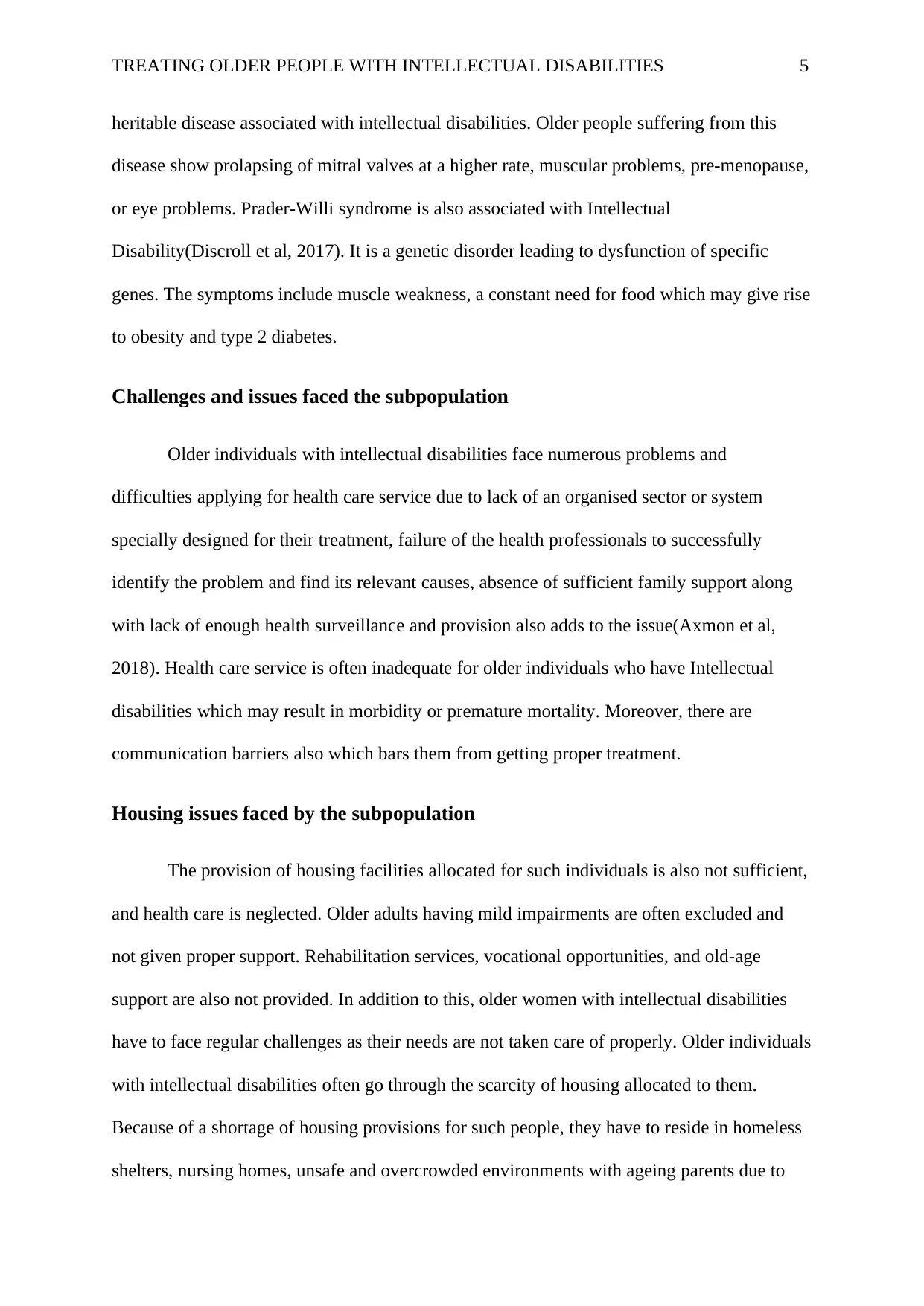
TREATING OLDER PEOPLE WITH INTELLECTUAL DISABILITIES 5
heritable disease associated with intellectual disabilities. Older people suffering from this
disease show prolapsing of mitral valves at a higher rate, muscular problems, pre-menopause,
or eye problems. Prader-Willi syndrome is also associated with Intellectual
Disability(Discroll et al, 2017). It is a genetic disorder leading to dysfunction of specific
genes. The symptoms include muscle weakness, a constant need for food which may give rise
to obesity and type 2 diabetes.
Challenges and issues faced the subpopulation
Older individuals with intellectual disabilities face numerous problems and
difficulties applying for health care service due to lack of an organised sector or system
specially designed for their treatment, failure of the health professionals to successfully
identify the problem and find its relevant causes, absence of sufficient family support along
with lack of enough health surveillance and provision also adds to the issue(Axmon et al,
2018). Health care service is often inadequate for older individuals who have Intellectual
disabilities which may result in morbidity or premature mortality. Moreover, there are
communication barriers also which bars them from getting proper treatment.
Housing issues faced by the subpopulation
The provision of housing facilities allocated for such individuals is also not sufficient,
and health care is neglected. Older adults having mild impairments are often excluded and
not given proper support. Rehabilitation services, vocational opportunities, and old-age
support are also not provided. In addition to this, older women with intellectual disabilities
have to face regular challenges as their needs are not taken care of properly. Older individuals
with intellectual disabilities often go through the scarcity of housing allocated to them.
Because of a shortage of housing provisions for such people, they have to reside in homeless
shelters, nursing homes, unsafe and overcrowded environments with ageing parents due to
heritable disease associated with intellectual disabilities. Older people suffering from this
disease show prolapsing of mitral valves at a higher rate, muscular problems, pre-menopause,
or eye problems. Prader-Willi syndrome is also associated with Intellectual
Disability(Discroll et al, 2017). It is a genetic disorder leading to dysfunction of specific
genes. The symptoms include muscle weakness, a constant need for food which may give rise
to obesity and type 2 diabetes.
Challenges and issues faced the subpopulation
Older individuals with intellectual disabilities face numerous problems and
difficulties applying for health care service due to lack of an organised sector or system
specially designed for their treatment, failure of the health professionals to successfully
identify the problem and find its relevant causes, absence of sufficient family support along
with lack of enough health surveillance and provision also adds to the issue(Axmon et al,
2018). Health care service is often inadequate for older individuals who have Intellectual
disabilities which may result in morbidity or premature mortality. Moreover, there are
communication barriers also which bars them from getting proper treatment.
Housing issues faced by the subpopulation
The provision of housing facilities allocated for such individuals is also not sufficient,
and health care is neglected. Older adults having mild impairments are often excluded and
not given proper support. Rehabilitation services, vocational opportunities, and old-age
support are also not provided. In addition to this, older women with intellectual disabilities
have to face regular challenges as their needs are not taken care of properly. Older individuals
with intellectual disabilities often go through the scarcity of housing allocated to them.
Because of a shortage of housing provisions for such people, they have to reside in homeless
shelters, nursing homes, unsafe and overcrowded environments with ageing parents due to
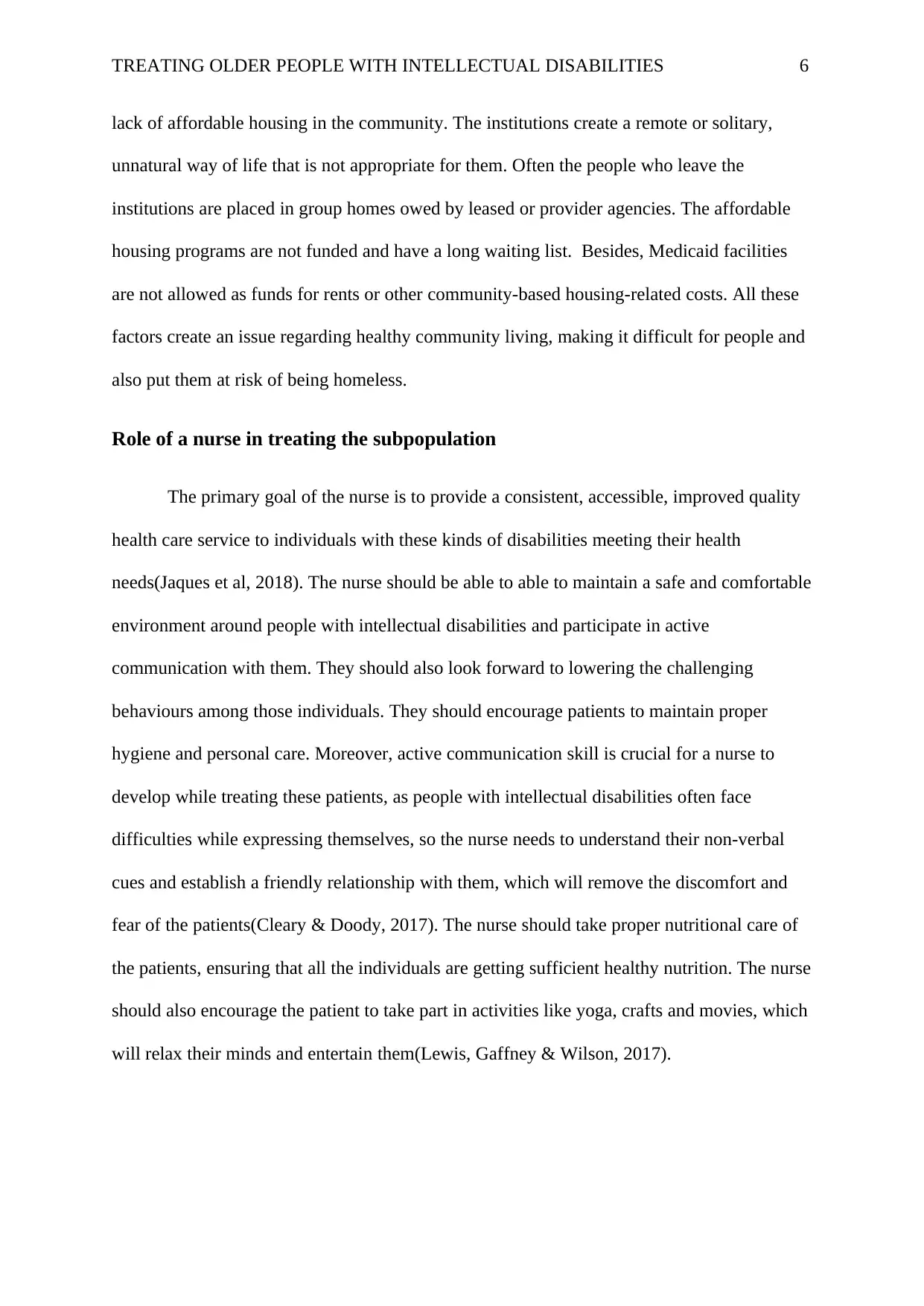
TREATING OLDER PEOPLE WITH INTELLECTUAL DISABILITIES 6
lack of affordable housing in the community. The institutions create a remote or solitary,
unnatural way of life that is not appropriate for them. Often the people who leave the
institutions are placed in group homes owed by leased or provider agencies. The affordable
housing programs are not funded and have a long waiting list. Besides, Medicaid facilities
are not allowed as funds for rents or other community-based housing-related costs. All these
factors create an issue regarding healthy community living, making it difficult for people and
also put them at risk of being homeless.
Role of a nurse in treating the subpopulation
The primary goal of the nurse is to provide a consistent, accessible, improved quality
health care service to individuals with these kinds of disabilities meeting their health
needs(Jaques et al, 2018). The nurse should be able to able to maintain a safe and comfortable
environment around people with intellectual disabilities and participate in active
communication with them. They should also look forward to lowering the challenging
behaviours among those individuals. They should encourage patients to maintain proper
hygiene and personal care. Moreover, active communication skill is crucial for a nurse to
develop while treating these patients, as people with intellectual disabilities often face
difficulties while expressing themselves, so the nurse needs to understand their non-verbal
cues and establish a friendly relationship with them, which will remove the discomfort and
fear of the patients(Cleary & Doody, 2017). The nurse should take proper nutritional care of
the patients, ensuring that all the individuals are getting sufficient healthy nutrition. The nurse
should also encourage the patient to take part in activities like yoga, crafts and movies, which
will relax their minds and entertain them(Lewis, Gaffney & Wilson, 2017).
lack of affordable housing in the community. The institutions create a remote or solitary,
unnatural way of life that is not appropriate for them. Often the people who leave the
institutions are placed in group homes owed by leased or provider agencies. The affordable
housing programs are not funded and have a long waiting list. Besides, Medicaid facilities
are not allowed as funds for rents or other community-based housing-related costs. All these
factors create an issue regarding healthy community living, making it difficult for people and
also put them at risk of being homeless.
Role of a nurse in treating the subpopulation
The primary goal of the nurse is to provide a consistent, accessible, improved quality
health care service to individuals with these kinds of disabilities meeting their health
needs(Jaques et al, 2018). The nurse should be able to able to maintain a safe and comfortable
environment around people with intellectual disabilities and participate in active
communication with them. They should also look forward to lowering the challenging
behaviours among those individuals. They should encourage patients to maintain proper
hygiene and personal care. Moreover, active communication skill is crucial for a nurse to
develop while treating these patients, as people with intellectual disabilities often face
difficulties while expressing themselves, so the nurse needs to understand their non-verbal
cues and establish a friendly relationship with them, which will remove the discomfort and
fear of the patients(Cleary & Doody, 2017). The nurse should take proper nutritional care of
the patients, ensuring that all the individuals are getting sufficient healthy nutrition. The nurse
should also encourage the patient to take part in activities like yoga, crafts and movies, which
will relax their minds and entertain them(Lewis, Gaffney & Wilson, 2017).
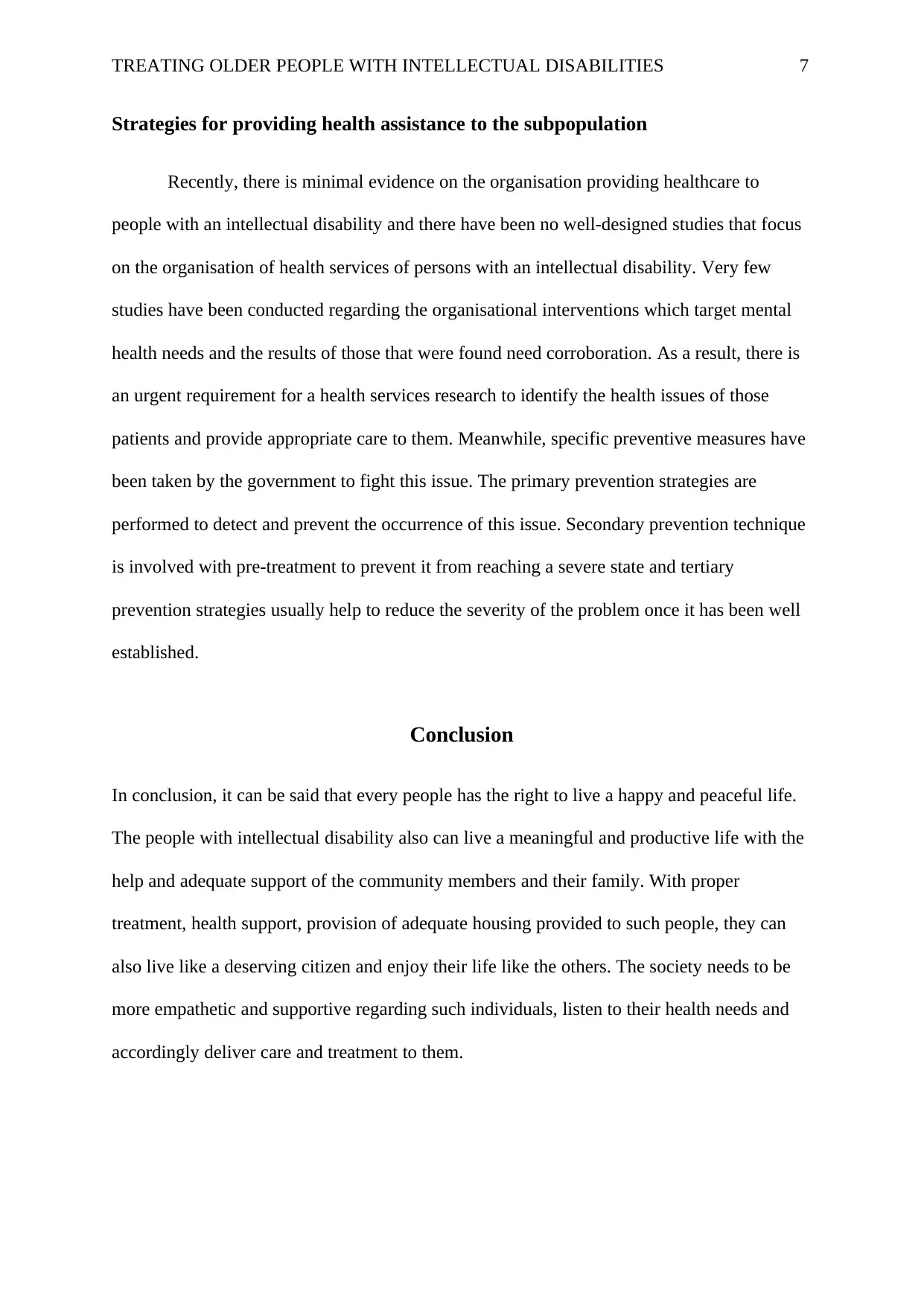
TREATING OLDER PEOPLE WITH INTELLECTUAL DISABILITIES 7
Strategies for providing health assistance to the subpopulation
Recently, there is minimal evidence on the organisation providing healthcare to
people with an intellectual disability and there have been no well‐designed studies that focus
on the organisation of health services of persons with an intellectual disability. Very few
studies have been conducted regarding the organisational interventions which target mental
health needs and the results of those that were found need corroboration. As a result, there is
an urgent requirement for a health services research to identify the health issues of those
patients and provide appropriate care to them. Meanwhile, specific preventive measures have
been taken by the government to fight this issue. The primary prevention strategies are
performed to detect and prevent the occurrence of this issue. Secondary prevention technique
is involved with pre-treatment to prevent it from reaching a severe state and tertiary
prevention strategies usually help to reduce the severity of the problem once it has been well
established.
Conclusion
In conclusion, it can be said that every people has the right to live a happy and peaceful life.
The people with intellectual disability also can live a meaningful and productive life with the
help and adequate support of the community members and their family. With proper
treatment, health support, provision of adequate housing provided to such people, they can
also live like a deserving citizen and enjoy their life like the others. The society needs to be
more empathetic and supportive regarding such individuals, listen to their health needs and
accordingly deliver care and treatment to them.
Strategies for providing health assistance to the subpopulation
Recently, there is minimal evidence on the organisation providing healthcare to
people with an intellectual disability and there have been no well‐designed studies that focus
on the organisation of health services of persons with an intellectual disability. Very few
studies have been conducted regarding the organisational interventions which target mental
health needs and the results of those that were found need corroboration. As a result, there is
an urgent requirement for a health services research to identify the health issues of those
patients and provide appropriate care to them. Meanwhile, specific preventive measures have
been taken by the government to fight this issue. The primary prevention strategies are
performed to detect and prevent the occurrence of this issue. Secondary prevention technique
is involved with pre-treatment to prevent it from reaching a severe state and tertiary
prevention strategies usually help to reduce the severity of the problem once it has been well
established.
Conclusion
In conclusion, it can be said that every people has the right to live a happy and peaceful life.
The people with intellectual disability also can live a meaningful and productive life with the
help and adequate support of the community members and their family. With proper
treatment, health support, provision of adequate housing provided to such people, they can
also live like a deserving citizen and enjoy their life like the others. The society needs to be
more empathetic and supportive regarding such individuals, listen to their health needs and
accordingly deliver care and treatment to them.
Paraphrase This Document
Need a fresh take? Get an instant paraphrase of this document with our AI Paraphraser
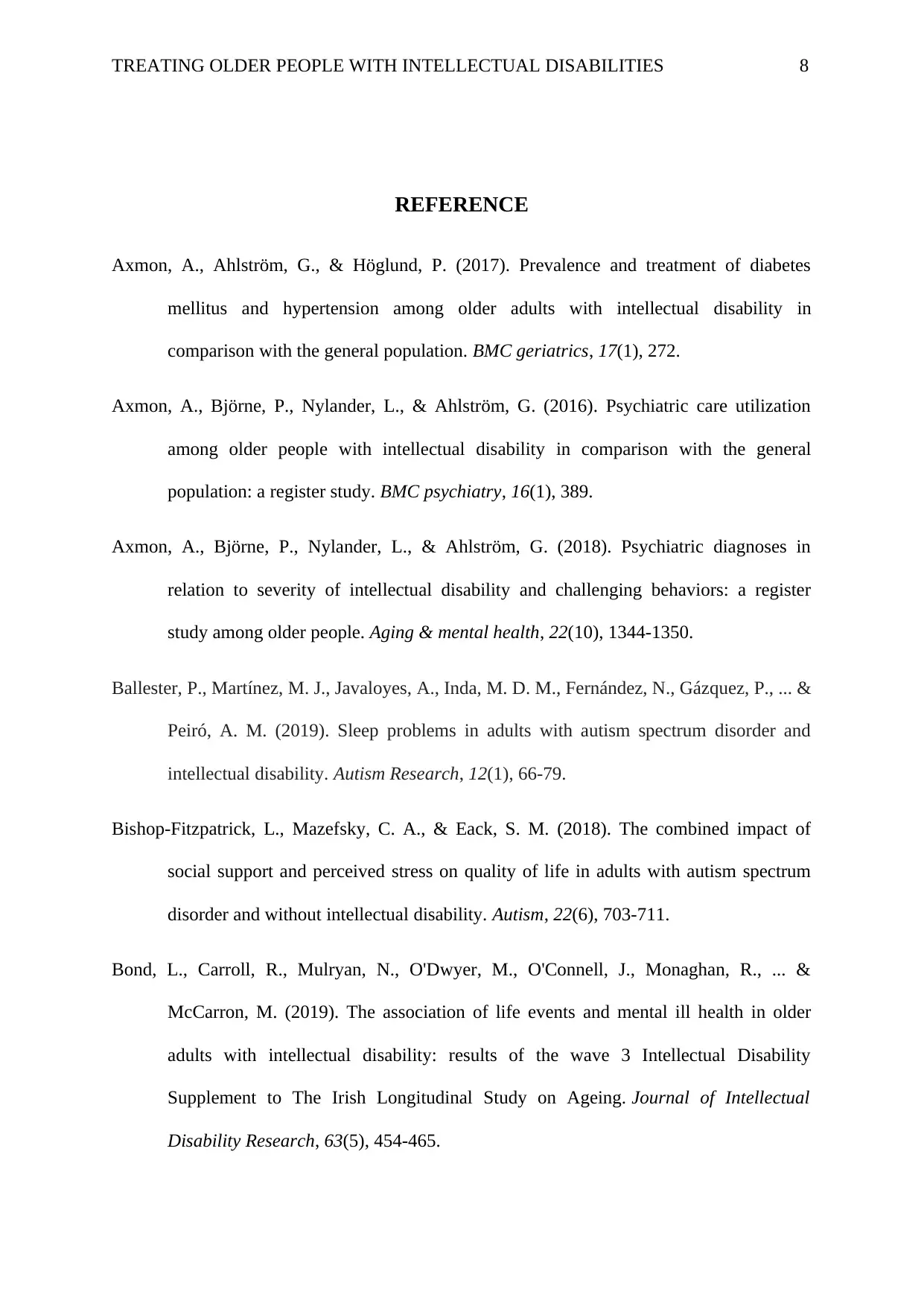
TREATING OLDER PEOPLE WITH INTELLECTUAL DISABILITIES 8
REFERENCE
Axmon, A., Ahlström, G., & Höglund, P. (2017). Prevalence and treatment of diabetes
mellitus and hypertension among older adults with intellectual disability in
comparison with the general population. BMC geriatrics, 17(1), 272.
Axmon, A., Björne, P., Nylander, L., & Ahlström, G. (2016). Psychiatric care utilization
among older people with intellectual disability in comparison with the general
population: a register study. BMC psychiatry, 16(1), 389.
Axmon, A., Björne, P., Nylander, L., & Ahlström, G. (2018). Psychiatric diagnoses in
relation to severity of intellectual disability and challenging behaviors: a register
study among older people. Aging & mental health, 22(10), 1344-1350.
Ballester, P., Martínez, M. J., Javaloyes, A., Inda, M. D. M., Fernández, N., Gázquez, P., ... &
Peiró, A. M. (2019). Sleep problems in adults with autism spectrum disorder and
intellectual disability. Autism Research, 12(1), 66-79.
Bishop-Fitzpatrick, L., Mazefsky, C. A., & Eack, S. M. (2018). The combined impact of
social support and perceived stress on quality of life in adults with autism spectrum
disorder and without intellectual disability. Autism, 22(6), 703-711.
Bond, L., Carroll, R., Mulryan, N., O'Dwyer, M., O'Connell, J., Monaghan, R., ... &
McCarron, M. (2019). The association of life events and mental ill health in older
adults with intellectual disability: results of the wave 3 Intellectual Disability
Supplement to The Irish Longitudinal Study on Ageing. Journal of Intellectual
Disability Research, 63(5), 454-465.
REFERENCE
Axmon, A., Ahlström, G., & Höglund, P. (2017). Prevalence and treatment of diabetes
mellitus and hypertension among older adults with intellectual disability in
comparison with the general population. BMC geriatrics, 17(1), 272.
Axmon, A., Björne, P., Nylander, L., & Ahlström, G. (2016). Psychiatric care utilization
among older people with intellectual disability in comparison with the general
population: a register study. BMC psychiatry, 16(1), 389.
Axmon, A., Björne, P., Nylander, L., & Ahlström, G. (2018). Psychiatric diagnoses in
relation to severity of intellectual disability and challenging behaviors: a register
study among older people. Aging & mental health, 22(10), 1344-1350.
Ballester, P., Martínez, M. J., Javaloyes, A., Inda, M. D. M., Fernández, N., Gázquez, P., ... &
Peiró, A. M. (2019). Sleep problems in adults with autism spectrum disorder and
intellectual disability. Autism Research, 12(1), 66-79.
Bishop-Fitzpatrick, L., Mazefsky, C. A., & Eack, S. M. (2018). The combined impact of
social support and perceived stress on quality of life in adults with autism spectrum
disorder and without intellectual disability. Autism, 22(6), 703-711.
Bond, L., Carroll, R., Mulryan, N., O'Dwyer, M., O'Connell, J., Monaghan, R., ... &
McCarron, M. (2019). The association of life events and mental ill health in older
adults with intellectual disability: results of the wave 3 Intellectual Disability
Supplement to The Irish Longitudinal Study on Ageing. Journal of Intellectual
Disability Research, 63(5), 454-465.
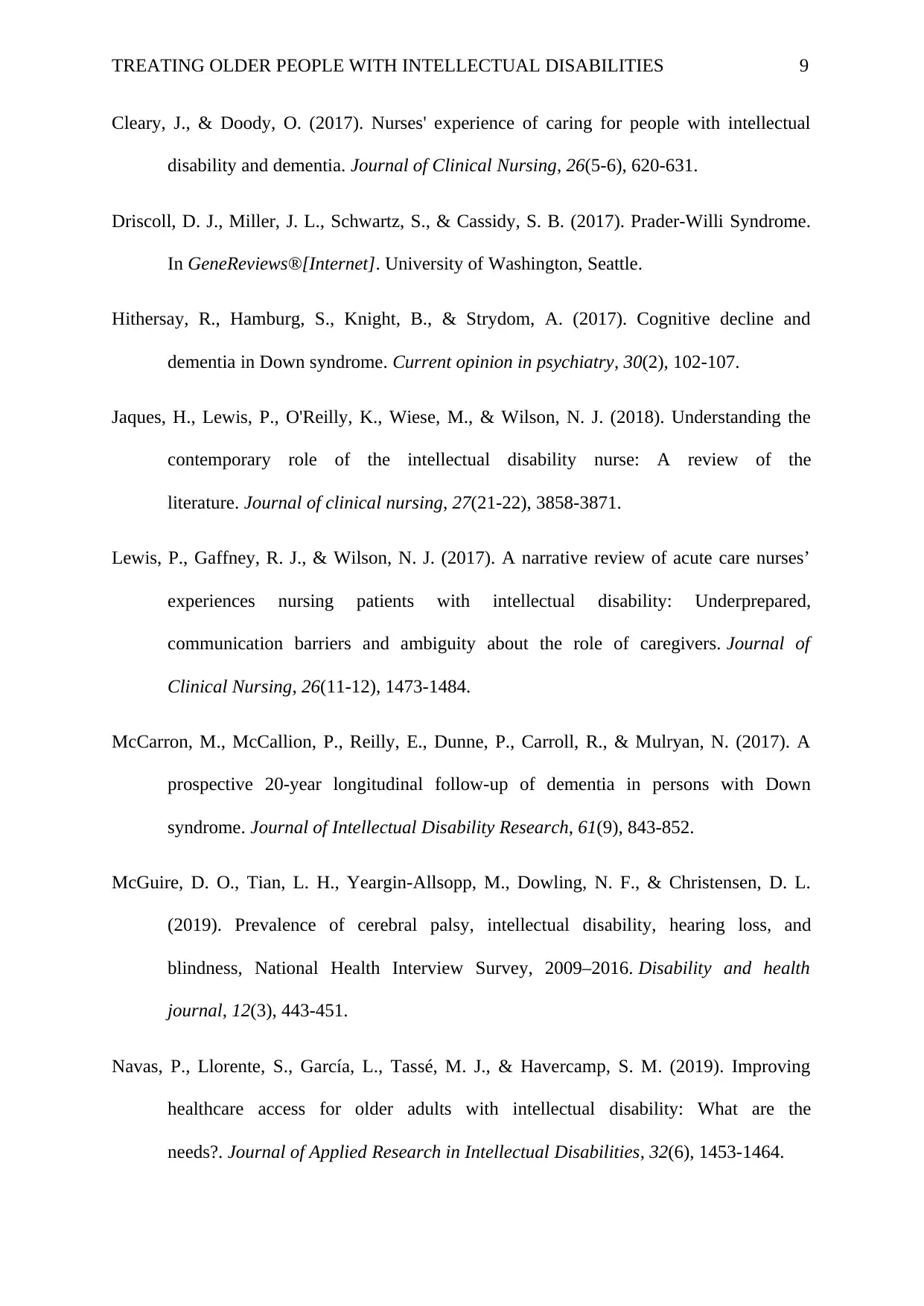
TREATING OLDER PEOPLE WITH INTELLECTUAL DISABILITIES 9
Cleary, J., & Doody, O. (2017). Nurses' experience of caring for people with intellectual
disability and dementia. Journal of Clinical Nursing, 26(5-6), 620-631.
Driscoll, D. J., Miller, J. L., Schwartz, S., & Cassidy, S. B. (2017). Prader-Willi Syndrome.
In GeneReviews®[Internet]. University of Washington, Seattle.
Hithersay, R., Hamburg, S., Knight, B., & Strydom, A. (2017). Cognitive decline and
dementia in Down syndrome. Current opinion in psychiatry, 30(2), 102-107.
Jaques, H., Lewis, P., O'Reilly, K., Wiese, M., & Wilson, N. J. (2018). Understanding the
contemporary role of the intellectual disability nurse: A review of the
literature. Journal of clinical nursing, 27(21-22), 3858-3871.
Lewis, P., Gaffney, R. J., & Wilson, N. J. (2017). A narrative review of acute care nurses’
experiences nursing patients with intellectual disability: Underprepared,
communication barriers and ambiguity about the role of caregivers. Journal of
Clinical Nursing, 26(11-12), 1473-1484.
McCarron, M., McCallion, P., Reilly, E., Dunne, P., Carroll, R., & Mulryan, N. (2017). A
prospective 20‐year longitudinal follow‐up of dementia in persons with Down
syndrome. Journal of Intellectual Disability Research, 61(9), 843-852.
McGuire, D. O., Tian, L. H., Yeargin-Allsopp, M., Dowling, N. F., & Christensen, D. L.
(2019). Prevalence of cerebral palsy, intellectual disability, hearing loss, and
blindness, National Health Interview Survey, 2009–2016. Disability and health
journal, 12(3), 443-451.
Navas, P., Llorente, S., García, L., Tassé, M. J., & Havercamp, S. M. (2019). Improving
healthcare access for older adults with intellectual disability: What are the
needs?. Journal of Applied Research in Intellectual Disabilities, 32(6), 1453-1464.
Cleary, J., & Doody, O. (2017). Nurses' experience of caring for people with intellectual
disability and dementia. Journal of Clinical Nursing, 26(5-6), 620-631.
Driscoll, D. J., Miller, J. L., Schwartz, S., & Cassidy, S. B. (2017). Prader-Willi Syndrome.
In GeneReviews®[Internet]. University of Washington, Seattle.
Hithersay, R., Hamburg, S., Knight, B., & Strydom, A. (2017). Cognitive decline and
dementia in Down syndrome. Current opinion in psychiatry, 30(2), 102-107.
Jaques, H., Lewis, P., O'Reilly, K., Wiese, M., & Wilson, N. J. (2018). Understanding the
contemporary role of the intellectual disability nurse: A review of the
literature. Journal of clinical nursing, 27(21-22), 3858-3871.
Lewis, P., Gaffney, R. J., & Wilson, N. J. (2017). A narrative review of acute care nurses’
experiences nursing patients with intellectual disability: Underprepared,
communication barriers and ambiguity about the role of caregivers. Journal of
Clinical Nursing, 26(11-12), 1473-1484.
McCarron, M., McCallion, P., Reilly, E., Dunne, P., Carroll, R., & Mulryan, N. (2017). A
prospective 20‐year longitudinal follow‐up of dementia in persons with Down
syndrome. Journal of Intellectual Disability Research, 61(9), 843-852.
McGuire, D. O., Tian, L. H., Yeargin-Allsopp, M., Dowling, N. F., & Christensen, D. L.
(2019). Prevalence of cerebral palsy, intellectual disability, hearing loss, and
blindness, National Health Interview Survey, 2009–2016. Disability and health
journal, 12(3), 443-451.
Navas, P., Llorente, S., García, L., Tassé, M. J., & Havercamp, S. M. (2019). Improving
healthcare access for older adults with intellectual disability: What are the
needs?. Journal of Applied Research in Intellectual Disabilities, 32(6), 1453-1464.
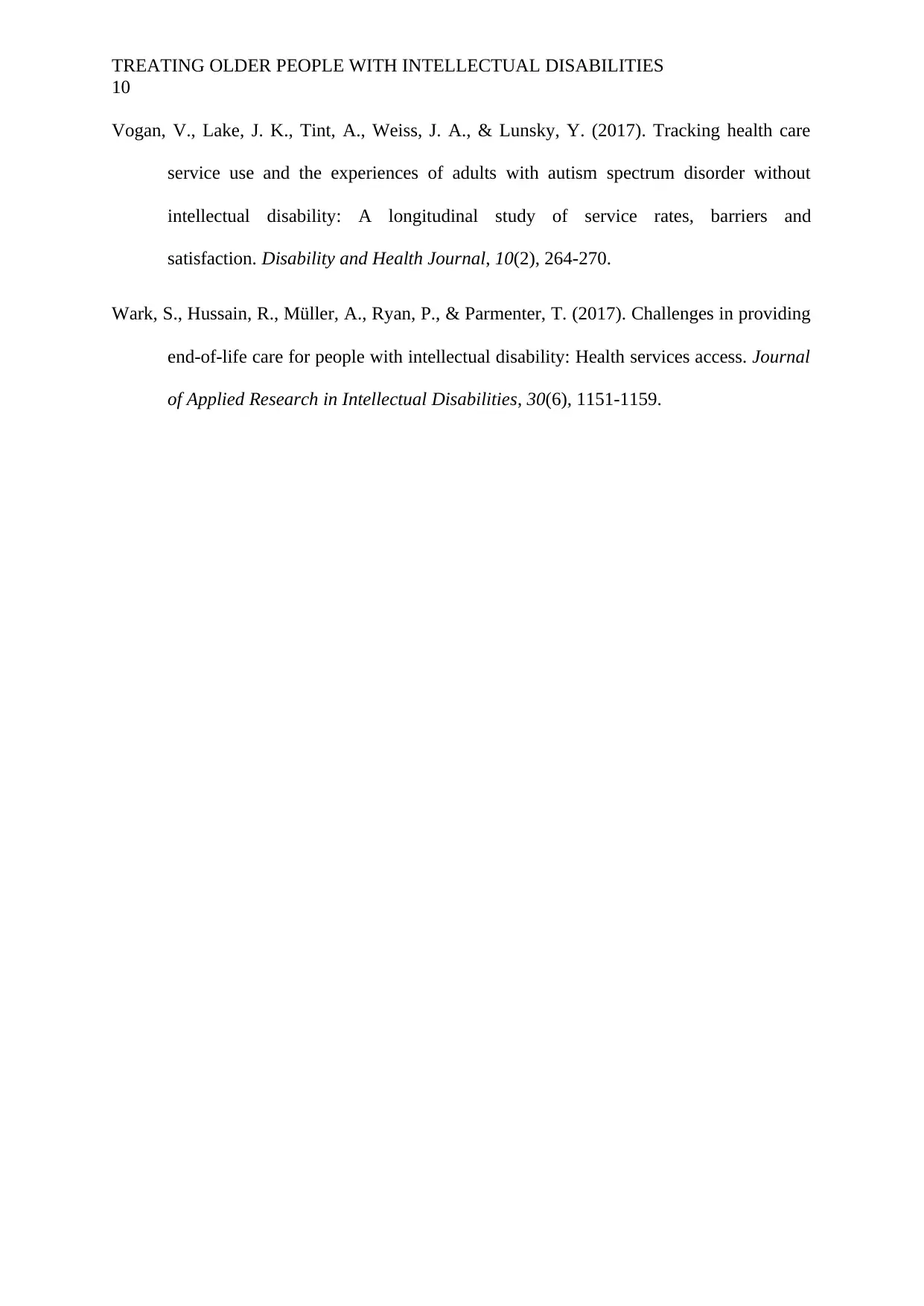
TREATING OLDER PEOPLE WITH INTELLECTUAL DISABILITIES
10
Vogan, V., Lake, J. K., Tint, A., Weiss, J. A., & Lunsky, Y. (2017). Tracking health care
service use and the experiences of adults with autism spectrum disorder without
intellectual disability: A longitudinal study of service rates, barriers and
satisfaction. Disability and Health Journal, 10(2), 264-270.
Wark, S., Hussain, R., Müller, A., Ryan, P., & Parmenter, T. (2017). Challenges in providing
end‐of‐life care for people with intellectual disability: Health services access. Journal
of Applied Research in Intellectual Disabilities, 30(6), 1151-1159.
10
Vogan, V., Lake, J. K., Tint, A., Weiss, J. A., & Lunsky, Y. (2017). Tracking health care
service use and the experiences of adults with autism spectrum disorder without
intellectual disability: A longitudinal study of service rates, barriers and
satisfaction. Disability and Health Journal, 10(2), 264-270.
Wark, S., Hussain, R., Müller, A., Ryan, P., & Parmenter, T. (2017). Challenges in providing
end‐of‐life care for people with intellectual disability: Health services access. Journal
of Applied Research in Intellectual Disabilities, 30(6), 1151-1159.
1 out of 10
Related Documents
Your All-in-One AI-Powered Toolkit for Academic Success.
+13062052269
info@desklib.com
Available 24*7 on WhatsApp / Email
![[object Object]](/_next/static/media/star-bottom.7253800d.svg)
Unlock your academic potential
© 2024 | Zucol Services PVT LTD | All rights reserved.





